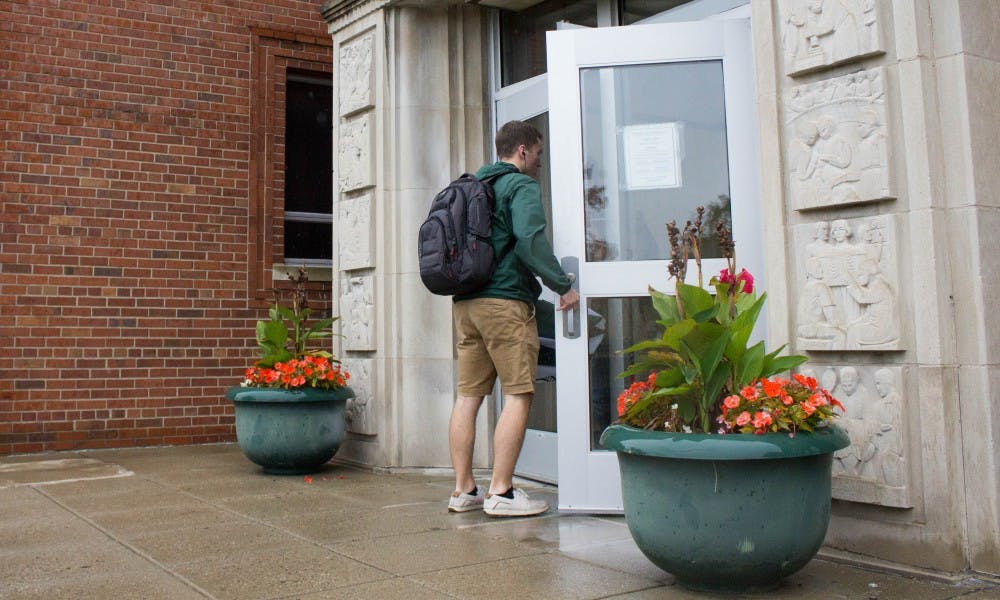When the air turns frigid and snow begins to fall, every student at Michigan State University knows what’s to come: a long, unforgiving winter. This merry season brings a whole new host of sights and sounds — holiday lights, tasty new Starbucks drinks and the sweet symphony of 100 people coughing in a lecture hall.
All across campus, students with runny noses and sore throats will unwillingly participate in MSU’s most cherished holiday tradition: the campus plague.
While the name may seem misleading, “campus plague” is not actually a plague, but rather a term used to describe the host of cold-like illnesses that are spread around campus every fall and winter.
These may include — but are not limited to — strep throat, influenza, a common cold, norovirus, bronchitis and mononucleosis. According to Kathleen Braunlich, marketing and communications director at Olin Health Center, most of the cases seen at Olin this year are early cases of influenza, as well as a virus that mimics the symptoms of influenza.
Though these seasonal illnesses are quite common everywhere in the fall and winter, college students seem to get sick more often and in higher numbers. Dr. Robert Glandon, assistant professor of Human Medicine and Public Health at MSU, thinks that it's "hard for students to stay healthy in general” due to many different factors.
“I think that sometimes students, as well as all of us, might forget the fundamentals of a healthy lifestyle. We sometimes get very busy, we get stressed out with heavy course workloads, social activities and work,” Glandon said. “We don’t get enough sleep, we don’t exercise regularly, we don’t wash our hands, our stress is high. It’s like the basics that we’ve heard a lot, but sometimes they slip our attention.”
Glandon said that, due to the size of the student population, diseases can be spread more easily because of close proximity. He said proper hygiene is especially important on campus.
“If we’re thinking back to the viruses that cause cold and flu, they can stay in the environment if a person who has a cold, say, covers their mouth when they sneeze and then goes to touch the handrail on the way down the stairs, they can actually contaminate the handrail for a while, and that can stay there for days, the virus, until somebody coming down sliding their hand right over the same spot," he said. "So, washing hands is really important. ... That’s part of my message is just to stick with the fundamentals."
Despite the highly contagious nature of these illnesses, many students still attend classes.
Jack Ploucha, a sophomore business-preference major at MSU who said he has had strep throat twice this semester, said that he continued to attend classes while sick because he feared absences negatively affecting his grades.
“When I had strep throat, I still went to all of my classes because I feared getting behind and also I didn’t want to lose those attendance points,” Ploucha said.
Instructors often require a doctor’s note from sick students missing class, but it is difficult for students to obtain one from Olin, Ploucha said. Because of this, many students will continue to attend classes while still exhibiting symptoms.
“When I go to class, and you’re sitting in a large lecture, you just kind of hear a dull roar of coughing and sneezing all the time, and it just seems like everyone (is sick),” he said. “It seems like at least a month ago there was an illness going around MSU where it seemed like everyone was coughing or sneezing or sniffling or something like that.”
Grace Murphy, a sophomore at MSU, contracted strep throat this year despite having her tonsils removed over the summer due to multiple cases of strep throat during the 2018-19 school year. She said some of her professors were not willing to accommodate sick students who requested to miss class in order to recover.
She said, before coming to college, she “never got sick."
“Last year, I would have to go to class even when I was sick just so that I could get full credit for attendance because they were like, 'Here’s the amount of days you get off, and that’s it,'" Murphy said. “I would make sure to go to class, but when I wasn’t in class I would just rest."
Lucy VanDyke, a psychology freshman, said she was sick for over a month this semester with an undiagnosed illness. She said some professors are understanding about sicknesses, but for the most part, MSU does not do enough to help students suffering from illness.
“It was definitely harder because I didn’t want to miss any of my hard classes, so I was trying to pick and choose which ones I would miss on the days that I was really bad,” VanDyke said. “I just kind of had to suck it up and drag myself there."
Support student media!
Please consider donating to The State News and help fund the future of journalism.
Discussion
Share and discuss “Being sick on campus: 'I still went to all of my classes because I feared getting behind'” on social media.







